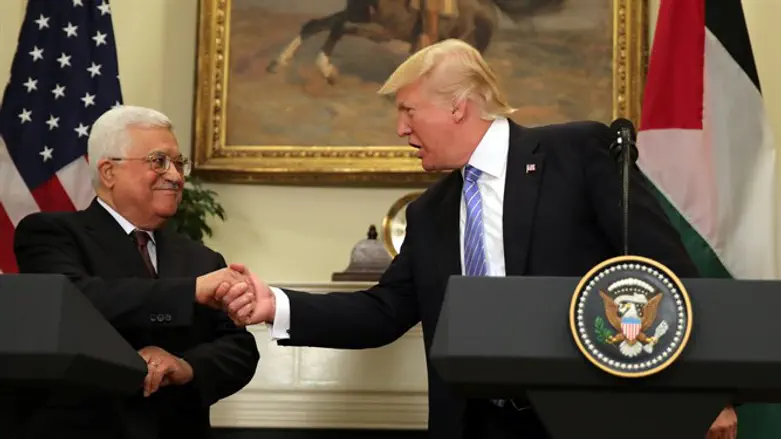
Three concessions made by Mahmoud Abbas - following pressure placed on him by President Trump - open the way to possible negotiations between Israel, the Palestinian Arabs, Egypt and Jordan to resolve the 100 years old Israel-Arab conflict.
Abbas has agreed to:
Withdraw his 2014 demand that Israel first agree to freeze building within Jewish settlements in Judea and Samaria (aka 'West Bank') as a pre-condition to resuming negotiations with Israel.
Tone down his campaign to prosecute Israel for alleged war crimes and rallying condemnation of the Jewish state at the United Nations.
Cease paying salaries to 277 released Hamas prisoners including Director of Hamas’s Political Bureau in the Gaza Strip - Yahya Al-Sinwar.
Israel sentenced Al-Sinwar to four life terms in the late 1980s but released him after 23 years imprisonment in a swap of 1,047 Palestinian prisoners for Israeli soldier Gilad Shalit in 2006. Al-Sinwar headed Hamas’s first security unit responsible for tracking and killing Palestinians accused of collaborating with Israel.
Abbas’s spectacular capitulation, although yet to be proven, comes just two weeks after his reportedly fiery meeting with President Trump in Bethlehem on 23 May – when Trump had stressed:
“.. the importance of creating an environment consistent with the desire for peace”
Trump had then warned Abbas at their subsequent media conference:
“Peace can never take root in an environment where violence is tolerated, funded and even rewarded. We must be resolute in condemning such acts in a single, unified voice.”
These three Abbas concessions may sufficiently satisfy Trump to pressure Netanyahu to resume negotiations.
However such negotiations – if conducted only between Abbas and Netanyahu - will assuredly fail and end up in the garbage bin of history - joining other unsuccessful negotiations conducted between them over the last ten years - for the following reasons:
-Whilst Hamas and Fatah continue their internecine struggle for political control of the Gazan and 'West Bank' Arab populations and refuse to countenance the holding of elections for the first time since 2006 – no permanent peace agreement can emerge from such resumed negotiations.
-Hamas and the Palestine Liberation Organisation will not abandon their campaigns to wipe Israel off the face of the map – as clearly stated in their respective Charters.
Trump will need to unscramble the following seemingly intractable and mutually contradictory demands being made by Netanyahu and Abbas if he wants to succeed where so many before him have abjectly failed:
·
-Israel being recognised as the national home of the Jewish people
· - Israel retaining military and security control in and over Judea and Samaria ('West Bank')
· -any Palestinian State being demilitarised
· -Jerusalem remaining united as the capital of Israel
· -A second Arab State - in addition to Jordan – being created in the territory of the Mandate for Palestine and the capital of that State being located in Jerusalem
· - Israel withdrawing totally from the territories lost by Jordan to Israel in the 1967 Six Day War
· -Palestinian Arabs retaining their claimed right of return to Israel.
Trump may well intend trying to resolve these demands by including other Arab States in any new round of negotiations – as this White House Press Office Readout of Trump’s 23rd May meeting with Abbas tantalisingly suggests:
“The two leaders discussed ways to advance negotiations and considered how Arab states might support those negotiations.”
Egypt and Jordan – enjoying signed peace treaties with Israel since 1979 and 1994 respectively - could be just those States.
Such four-party negotiations - conducted under Trump’s oversight and using his proven skills in successfully negotiating and concluding deals - could be the key to ending the logjam of failed negotiations since 1993.
Hope springs eternal.